December 4, 2023 - No. 60
Quebec Public Sector Workers Hold Series of National Strikes
Striking Workers Are One With the Needs of
Quebec People for Public Services
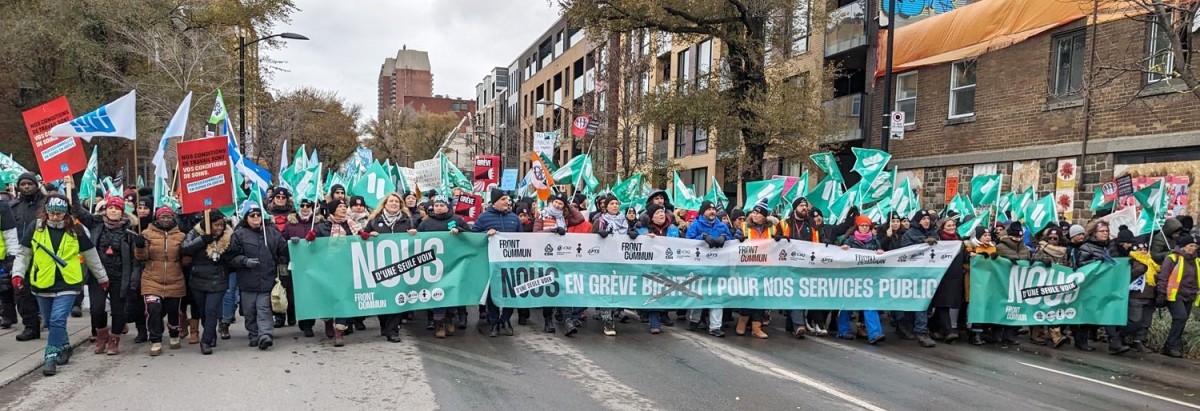
Common Front, Montreal,
November 23, 2023
• Legault Government Wants "Flexibility" to Continue Privatizing and Destroying Public Services
• Pension Fund a Neglected Issue in Public Sector Negotiations
• There Are Limits Say Quebec Health Care Professionals
• Quebec Independent Community Action Network Supports Public Sector Workers' Mobilization
Letter to the Editor
• Stop Paying the Rich to Build a Truly Public Health Care System
Photo Review
Quebec Public Sector Workers Hold Series of National Strikes
Striking Workers Are One With the Needs of
Quebec
People for Public Services

November 23, 2023
Across
Quebec, teachers, education workers and staff in educational
institutions, from daycare to CEGEP, and all those working in health
care and social services have been taking actions on a national scale
to demand higher wages and suitable working conditions. Placards
underscored the consciousness of the workers and the many who came out
to support them of the immense contribution they make to society. Many
exposed the self-serving rhetoric of the government. Many workers
pointed to the fact that the government spends millions and
billions of dollars to bring American sports teams to Quebec and to pay
mining companies to extract Quebec's minerals for the U.S. battery
industry, while every dollar invested to meet the demands of public
sector workers is deemed an expense which exhausts the treasury.
The
Quebec-wide strikes which took place November 21-24 are an
expression of
the collective awareness of the people of Quebec that building a
public
health care and education system depends on the expertise and
demands
of those who deliver these public services every day. On November
23, all public schools and CEGEPs were closed and
health care workers, while respecting the Essential Services Maintenance Act, joined them as
well. There are now more than 600,000 public sector workers on
strike. This week, the members of the Interprofessional Health
Federation of Quebec
(FIQ) joined the 420,000
workers in health, education and social services organized in a
Common
Front, who have been picketing at their workplaces and holding
rallies since the beginning of November. It has become a national
endeavour to defend
public services and support the demands of the workers who provide
them.
On
November 20, Quebec Treasury Board President Sonia LeBel, who is also
the Minister responsible for Government Administration, confirmed once
again on LCN's Le Bilan
program that the government's most important objective in these
negotiations is to get the unions to agree to flexibility in the
organization of the work. In other words, the government wants a free
hand to dictate the tasks and working conditions of teachers and their
colleagues in educational institutions, as well as in health care and
social programs. Her interview revealed once again the government's
profound contempt for union organizations and the workers themselves,
all of whom it considers obstacles to problem-solving.
For
example, according to the government, the shortage of teachers and
nurses is not due to the cutbacks, funding of private institutions
and the rotten working conditions, but because the unions won't give up
the workers' rights on how tasks are assigned. The government wants to
get rid of all constraints that prevent it from doing what it wants with
the human and financial resources of the public sector, with no regard
for the human factor. Workers are also aware that the government's
persistence in centralizing power in the hands of ministers is already
enshrined in the anti-social Bill 15 concerning the health care system
and in Bill 23 concerning education.
Workers in
health care,
education and the social sector are considered disposable commodities
to be moved around at the whim of private interests that the government has
put in charge of these spheres. It is well known that it is precisely
the numerous decrees, cuts and diversion of money to the private sector
that have created the untenable conditions the people experience today.
The refusal of public sector workers to submit to the organization of
work that increasingly serves private interests is definitely what
protects the conception of a health care and education system which
serves the people. Their starting point is to meet the many needs of
the entire population. That's also why the vast majority of the
population support the workers who care for them, despite the
government's attempts to divide them, and all the juggling that
families have to do when schools, daycare and health care facilities close.
The
teachers' strike, which began on November 23, affects almost 40 per
cent of Quebec schools. Mélanie Hubert, President of the
Autonomous Teachers Federation (FAE), noted that the last unlimited
general strike by teachers was in 1983. "[B]ut what's different from
what happened 40 years ago is that this time, teachers are fighting for
the survival of public services [...] because they believe that
services to students have deteriorated to the point where there are no
other solutions to bring about change," she pointed out.
The
Quebec government has a responsibility to provide working conditions
that those who provide public services to the population consider
adequate.
Further Strike Days Announced
On November 28, the Common Front announced another series of strike days from December 8 to 14. The following day, the FIQ informed the public that its members would be exercising their right to strike from December 11 to 14.
Legault Government Wants "Flexibility" to Continue Privatizing and Destroying Public Services

Montreal, November 23, 2023
On the morning of November 23, the day 570,000 public service workers in Quebec went on strike, Premier François Legault said at a press briefing that he was prepared to improve the wage offer on condition that the unions agreed to more "flexibility" in working conditions. He said that "this is the only way we'll be able to improve services to the population."
Health and education workers have already pointed out that talk of "flexibility" or "organization of work" without increasing the resources required to meet needs simply means continuing to squeeze the lemon by various means. They point out that with this particular notion of "flexibility," which is not a new "demand" but a practice that has led to untenable situations for the service providers, decisions are made from above and the experience of those on the ground is discarded.
What the government means by "flexibility" and "work
organization," noted Julie Bouchard, President of the Interprofessional Health
Federation of Quebec (FIQ) "is more harmful than
anything else." For proof, she said, one need only look at the results
this has created in a government pilot project in
Mauricie-Centre-du-Québec. "There, the government has
already put in place a taste of what it wants for all of Quebec: to
move care professionals without regard for their experience and
expertise," says the FIQ in a press release. "The result: hundreds of
resignations. Then they come along and say that the organization of
work is the government's priority during these negotiations. ... This
will only increase the exodus we're already experiencing in the network
and decrease safe patient care," says the FIQ president.
Health Minister Lets the Cat Out of the Bag
In a press briefing on November 23, Health Minister Christian Dubé said out loud what his government was thinking with its demand for "flexibility." He said, "There really needs to be a change of approach" on the issue of work organization. "We need to change the right to unionize to a personal right," he said. "Our staff must have the choice to do what they want to do when they want to do it." If they want to work twelve-hour shifts, "they must be able to do so" and not "be blocked by the union," he said.
Legault claims he wants flexibility to "improve services to the population," but the truth comes out of the mouth of his Health Minister, who said: "Even if we gave them everything they want and still had the same work organization, I'm not able to implement my health plan" (our emphasis). He is referring to Bill 15, An Act to make the health and social services system more effective, which provides for a health reform that will facilitate the privatization of health system decision-making in Quebec. With this reform, the government establishes a new chain of command which concentrates decision-making and administrative power in the hands of the ministry along with a hand-picked Board of Directors made up of CEOs from private industry to head a new agency called Santé Québec.[1]
If the Legault government wanted to improve services to the population, it would break with the anti-social offensive pursued by all Quebec governments for the past fifty years, which has led to the deplorable state of public services we know today. Instead, it would recognize the need to increase investments in social programs that are essential to the future development of a modern Quebec. And it would stop the ongoing reforms whose essential aim is to concentrate decision-making power in the hands of the governments of the wealthy, to the detriment of the rights of workers and the people in general.
Note
1. "Massive Concentration of Decision-Making Power and Union-Busting," Pierre Chénier, Workers' Forum, May 25, 2023.
(Quotations translated from the original French by TML.)
Pension Fund a Neglected
Issue in Public
Sector Negotiations
One element that is receiving little attention at the moment is
the Quebec government's attack on the pension fund of its employees who
contribute to the Government and Public Employees Retirement Plan
(RREGOP). In the 1980s, the government imposed by decree the
cancellation of wage increases provided for at the end of
collective agreements, stole a billion dollars from the RREGOP and
abolished pension indexation, in addition to reducing the share of
contributions that the government must pay.
With the 2008 crisis, $30 billion disappeared from the RREGOP with commercial paper purchased on the U.S. stock market. Despite this fact, the proportion of investments made abroad increased under Michael Sabia. Sabia, current head of Hydro-Québec was President and CEO of the Caisse de dépôt et placement du Québec (CDPQ) from 2009 until January 2020 as well as Canada's Deputy Finance Minister after that. His estimated net work is around $60 million, encompassing his "earnings" from his various roles, investments, and real estate. Lest we forget, the CDPQ collects money from pension and insurance funds, police officers, firefighters, executives, municipal employees, etc., and was set up with the alleged aim of helping develop Quebec's economy.
It now wants to force people to work longer, first by cutting their pension by one per cent and then by setting the age of eligibility for a pension at 57, without any reduction or penalty. Sabia argued that the enhancement of the Quebec Pension Plan (QPP) in 2019, involving an increase in contributions to increase pensions, would encourage people to retire earlier.
Currently, once you've reached 35 years of service, you're eligible without penalty -- or at age 60, plus 30 years service, known as the 90 factor. So this targets people with 35 years service.
The government admits that the RREGOP has a surplus. These surpluses could be used to improve the plan, for instance with pension indexation.
So what will the surplus be used for? There are two possibilities:
1. reduce government contributions
2. increase the capital available at the CDPQ, capital made available to the wealthy for investment.
By reducing benefits to retirees, the government seeks to increase the capital available for pay-the-rich schemes.
There Are Limits Say Quebec Health Care Professionals
The Legault government is attempting to divide the population with the claim that the government's "ability to pay" must be respected. This was a claim echoed by Éric Girard, Minister of Finance, during the tabling of the economic update on November 7. This is a non-starter for care professionals and for all workers in the Common Front.
Prior to this, on November 3, the government threatened to abolish nurses' 3.5 per cent bonus as of November 5. This bonus was negotiated during the renewal of the 2020-2023 collective agreement. "One of the biggest demands of care professionals is that they be respected. By playing with their income, in an arbitrary and cavalier manner, the government is once again demonstrating its contempt for the women who work at arm's length from the health care network," said Nathalie Levesque, Vice-President and co-chair of the negotiations for the Interprofessional Health Federation of Quebec (FIQ).
"There are limits," the care professionals have declared in a unified voice.
"We're on strike because the government refuses to listen to us. The wage increase proposals will make us poorer, since they don't even cover inflation. And above all, the government wants to take a care professional and move her anywhere it pleases. It's madness, and we won't stand for it. It's inhumane for the workers and downright dangerous for the patients. We've reached a breaking point in the health care network, and the government wants to further degrade working conditions. Our message to them today is that if they continue to ignore the health of the public network, they will find us all in their path. Our working conditions are the health care conditions of all Quebeckers," affirmed Julie Bouchard, President of the FIQ.
(With files from FIQ. Quotations translated from original French by TML.)
Quebec Independent Community Action Network Supports Public Sector Workers' Mobilization
On November 20, on the eve of the three-day walkout of some 420,000 workers in the public and parapublic sectors, the Quebec Network of Autonomous Community Action (RQ-ACA) issued a press release declaring full support for their struggle. It states:
 "The
deterioration of public services that we have been witnessing for years
is the result of budgetary austerity and reforms which have
particularly impacted the most marginalized and vulnerable. This has
only exacerbated social inequalities," says Hugo Valiquette, president
of the RQ-ACA. "Recognizing the value of the work of the people who are
on the front lines every day to help the population requires decent
salary conditions. If the government really wants to promote the
importance of this essential network, it will take an investment that
meets the needs."
"The
deterioration of public services that we have been witnessing for years
is the result of budgetary austerity and reforms which have
particularly impacted the most marginalized and vulnerable. This has
only exacerbated social inequalities," says Hugo Valiquette, president
of the RQ-ACA. "Recognizing the value of the work of the people who are
on the front lines every day to help the population requires decent
salary conditions. If the government really wants to promote the
importance of this essential network, it will take an investment that
meets the needs."
The RQ-ACA, which has been mobilized for more than 20 years for greater social justice, is concerned about the progressive weakening of public services. "Over the years, the pressure on community organizations has only increased to compensate for the inadequacies of the public network. And this, while the community sector is also out of breath due to insufficient funding and the growing scarcity of labour. It's time for the government to take care of Quebec's social safety net," declares Caroline Toupin, coordinator.
Public services are essential to the realization of human rights. Privatization and pricing of services, which the government seems to idealize, are not viable solutions if we want to ensure that everyone has access to quality services.
"The Quebec state must preserve the universality of its services. And, as an employer, it has the responsibility to ensure decent working and living conditions for its workers," concluded Mr. Valiquette.
The RQ-ACA recalls that public services are largely carried out by women who work in various care professions, too often poorly recognized, underpaid and in difficult working conditions. He offered his full solidarity to the mobilizations taking place within the context of negotiations with the government of Quebec.
(Quotations translated from original French by TML.)
Letter to the Editor
Stop Paying the Rich to Build a Truly
Public
Health Care System
Sonia Lebel, President of the Quebec Treasury Board and Minister responsible for Government Administration, has used social networks to once again attempt to create the illusion that she and her government are acting in good faith and for the public interest in this period of negotiations. On November 19, on X, she posted a video, with dramatic music, in which she tried to undermine the immense popular support enjoyed by public sector workers by making them out to be extortionists of public wealth. She said (referring to the wage increases offered to 600,000 workers): "[W]e put 8 billion on the table, it's the citizens' money, it's serious...."
No one is fooled by the government's self-interested view of the use of the wealth created by Quebec workers, which says that investing in public services in line with the demands of those who work in them is an unaffordable cost, but a real investment when it comes to making billions of dollars available to private interests. The $15 billion allocated to the battery industry and the recent decree 1529-2023, dated October 18, which raised the limit applicable to the borrowing plan instituted by Investissement Québec as manager of the Economic Development Fund (EDF) -- the government's main tool for supporting businesses -- from $3.71 billion to $5.65 billion, are just two recent examples.
I want to tell all public sector workers that Sonia LeBel and the government don't speak for me! Education and health care workers are the ones defending a Quebec economy oriented to serve its people!
A Reader in Montreal
Photo Review
Days of Action
Across Quebec one-day strike actions were held November 21 and 23 by teachers, education workers and staff in educational institutions and by all those working in health care and social services. On November 23 and 24, strike days were organized by 80,000 nurses, nursing assistants, respiratory therapists and clinical perfusionists whose strike days were announced during their militant strikes on November 8 and 9 across Quebec in support of their demands.
November 24
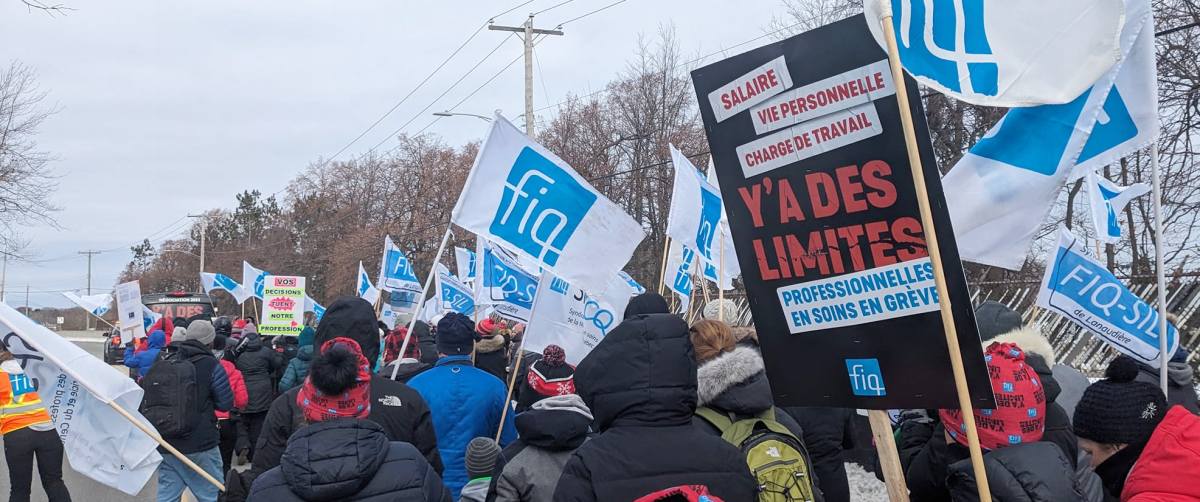
Nurses, nursing
assistants and other health care professionals strike,
Trois-Rivières,
November 24, 2023.
November 23

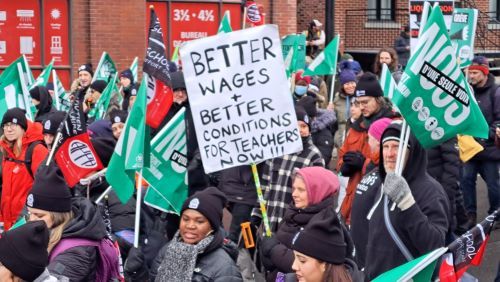
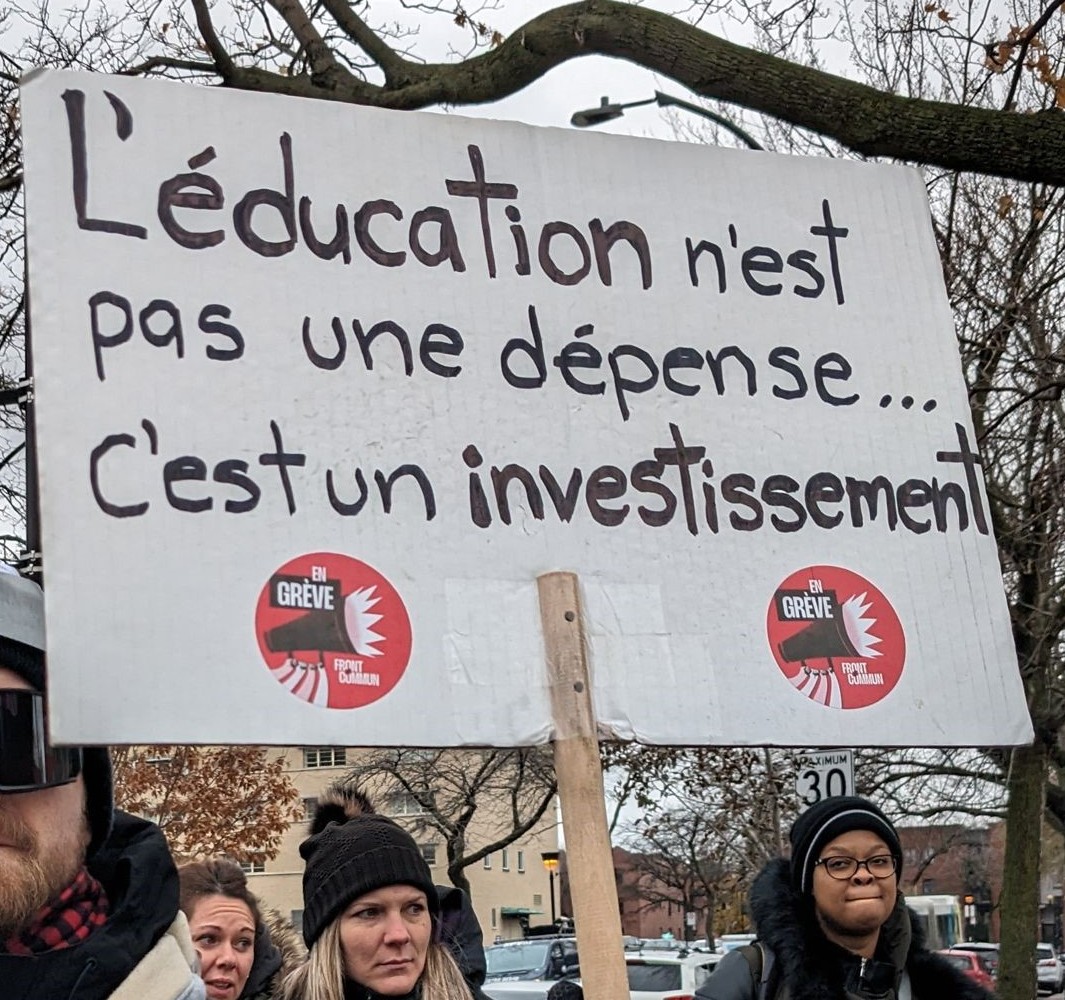
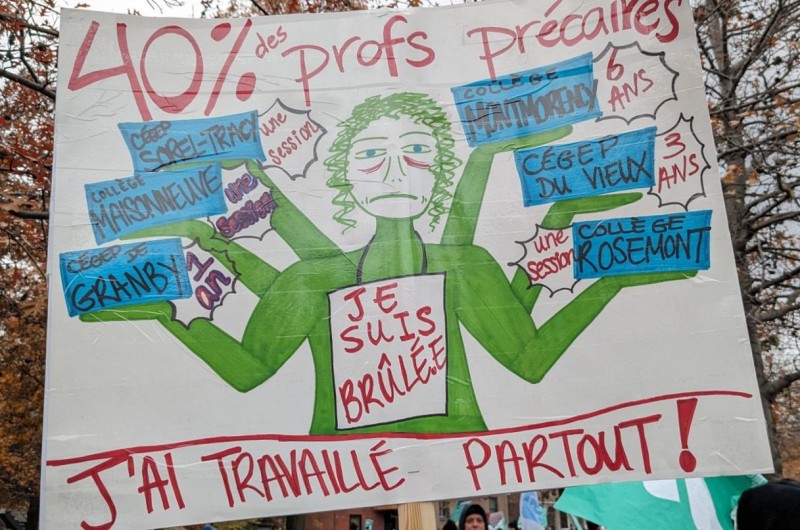






Montreal

Sept-Iles
 Fermont
Fermont
 Joliette
Joliette


Quebec City


Saguenay-Lac-Saint-Jean; Rouyn-Noranda
 Sherbrooke
Sherbrooke

Côte Nord
November 21





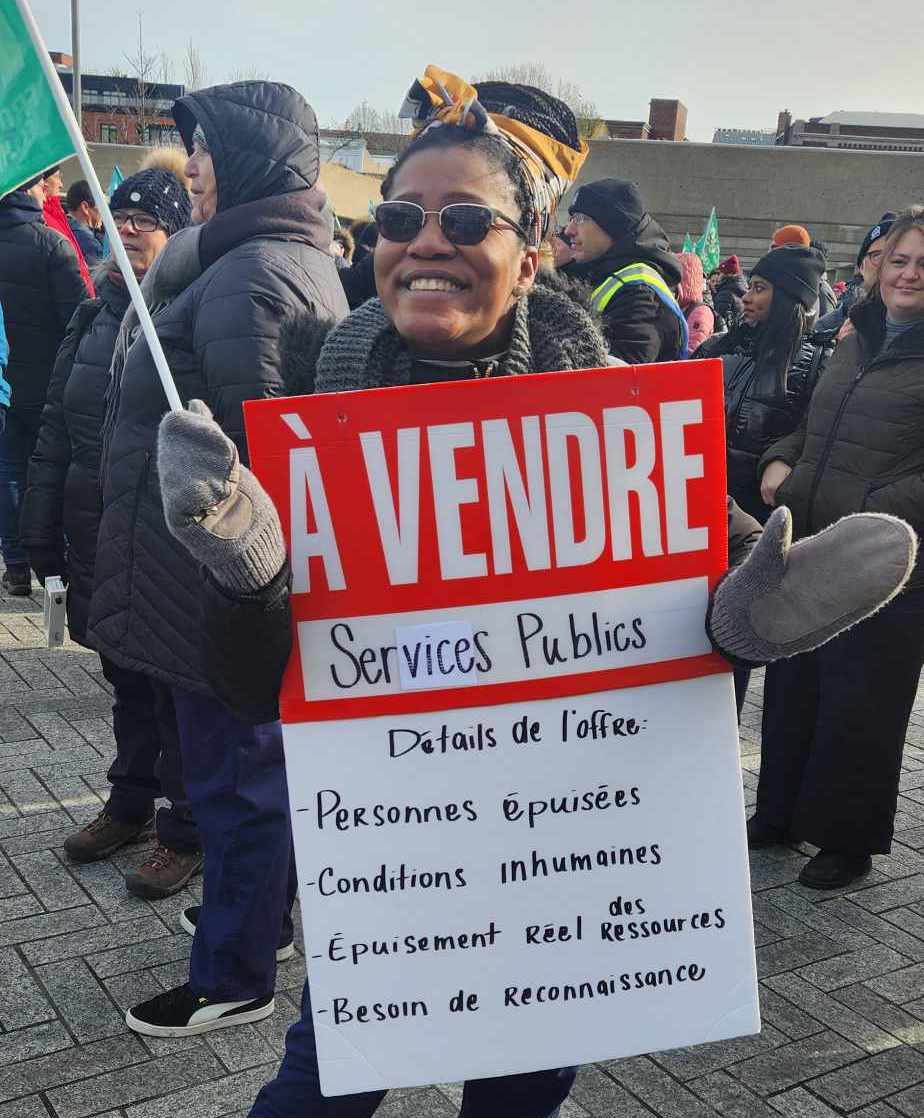

 Montreal
Montreal
 Mauricie
Mauricie
November 8-9

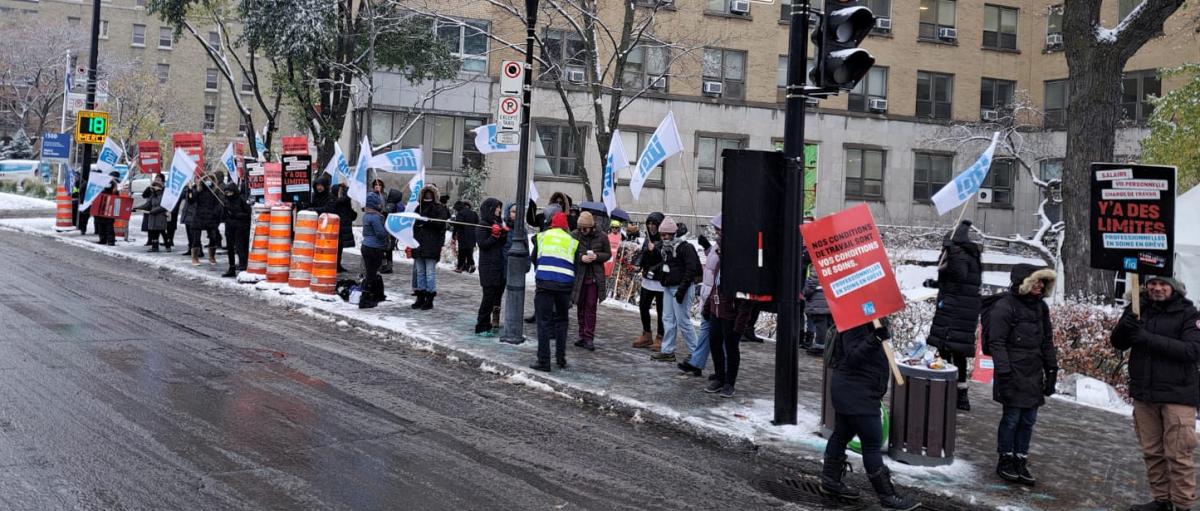



Montreal, November 9, 2023
 Outaouais, November 8, 2023
Outaouais, November 8, 2023
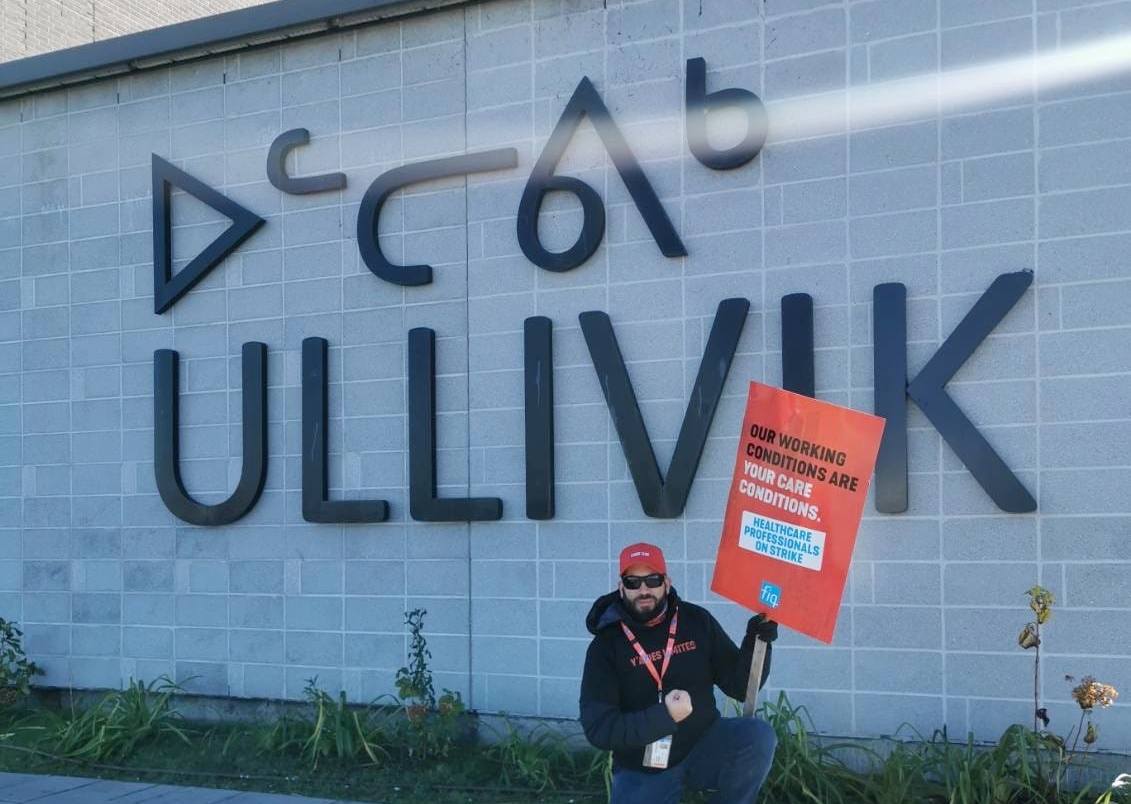 Ullivik, November 8, 2023
Ullivik, November 8, 2023
(Photos: PMLQ, A. Querry, CSN, CSQ, FIQ)
(To access articles individually click on the black headline.)
Website: www.cpcml.ca Email: editor@cpcml.ca



